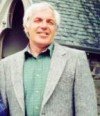Scottish people are called Scots. Things from Scotland are called Scottish, not Scotch, which refers solely to the drink.
James Lind, born Edinburgh, Scotland, October 4, 1716. Established the curative effect of lemon juice on scurvy.
Duncan I was the King of Scotland until he was slain by his cousin, Macbeth, on August 15, 1057. This slaying was the basis for the famous Shakespeare play, "Macbeth."
John Hunter, born East Kilbride, Scotland, February 13, 1728. Wrote The Natural History of the Human Teeth and laid the foundations for dental anatomy and pathology.
The Ghost of Mary Queen of Scots haunts the Talbot Hotel. Her Ghostly figure has been seen walking down the beautiful oak staircase, which was brought from the ruins at Fotheringhay, where she was executed.
Edward I (1272-1307, think "Long Shanks" in Brave Heart, was so wrapped up in his desire to subdue Scotland that on his death bed he extracted a promise from his son: When Scotland was attacked, his body was to go with the army. After Edward died his body was preserved in oiled linen. The promise was kept for the next two hundred years, his large tomb in Westminister Abbey being opened again and again.
Scotch Tape is a result of the 3M company's decision to put adhesive only on the edges of its tape. The tape did not work properly and among the returns was the complaint that the company should take back its "Scotch Tape". A reference to the supposed stinginess of Scots people.
The Scots believed in "Samhanach", a goblin who came out only on Samhain and stole children.
Margaret the wife of Malcolm III (King of Scotland) died on November 16, 1093. She was later declared a saint. To this day in Scotland, the grace cup is called St. Margaret's blessing.
The power of Edgar "the Peaceful" was such that as a sign of his power, Edward was rowed down the River Dee with the oars manned by 8 Kings of tributary kingdoms.
There are three Scottish place names which contain only two letters: Oa, Ae, and Bu.
The Lincoln Monument in Edinburgh's Old Carlton Cemetery was the first statue of an American president to be constructed outside the USA.
Carrying a bagpipe was considered to be as much a crime as carrying arms during the Jacobite rebellion, it was classified an "instrument of war"
In 1969 the U.S. astronaut Alan Bean, an American Scot carried a square metre of the MacBeath (MacBean) tartan with him on his historic Apollo XII space mission to the moon.
The Guinness Book of Records shows that the tallest Scotsman and the tallest "true" giant was Angus Macaskill. Born on the island of Berneray off the island of Harris in 1825, Macaskill was 7ft 9in (2.36m) tall. He was also strong, reputedly able to lift a hundredweight (50kg) with two fingers and hold it at arms length for ten minutes. He died on Cape Breton Island, Nova Scotia, in 1863. A cairn on Berneray commemorates him.
Before the 19th century tartans were not used in the identification of clans in Scotland. The plant badge that the men wore would tell the Scotsman's clan loyalties.
Scotland is the only country in Europe that the Romans could not conquer.
The Scots were the tallest race in Europe, according to the 1909 Census. But the carnage of WW1 changed that. By the 1930s, the average height of men in Scotland had been reduced by 9 inches.
The blue paint that Pictish, and later the Scottish warriors wore in battle was a hallocinogen. It was was the mould from rye.
The first kilts were worn by the Irish not the Scottish. However, many of the Irish moved to Scotland (Alba) and they brought their clothing with them.
Scotland is the only country in the world. that Coca cola is not the best selling soft drink. Irn Bru made by the Barr Company is the best selling soft drink.
Sheep theft is still legally a hangable offence in Scotland.
There are more pipe bands in America than in Scotland.
The word "whisky" or "whiskey" is derived from the Gaelic uisge breatha meaning "water of life."
The original name of Scotland was Caledonia.
Winter Palace With Bagpipes Music On Outlander History Visit To Falkland
Palace Fife Scotland
-
Tour Scotland short 4K Winter travel video clip, with Scottish bagpipes,
of the Palace in Falkland village on ancestry, genealogy, family history
Outlande...
2 hours ago





No comments:
Post a Comment